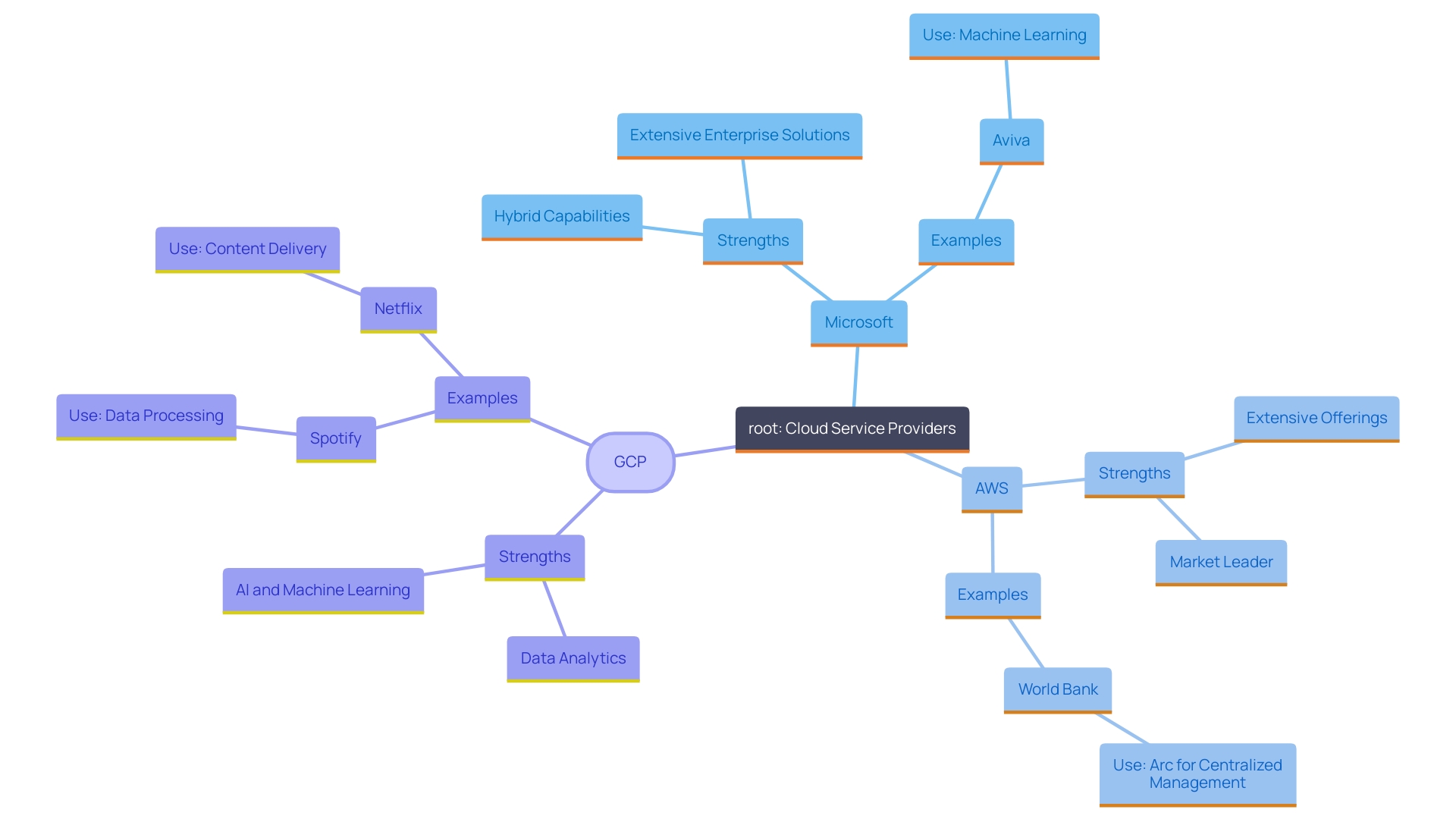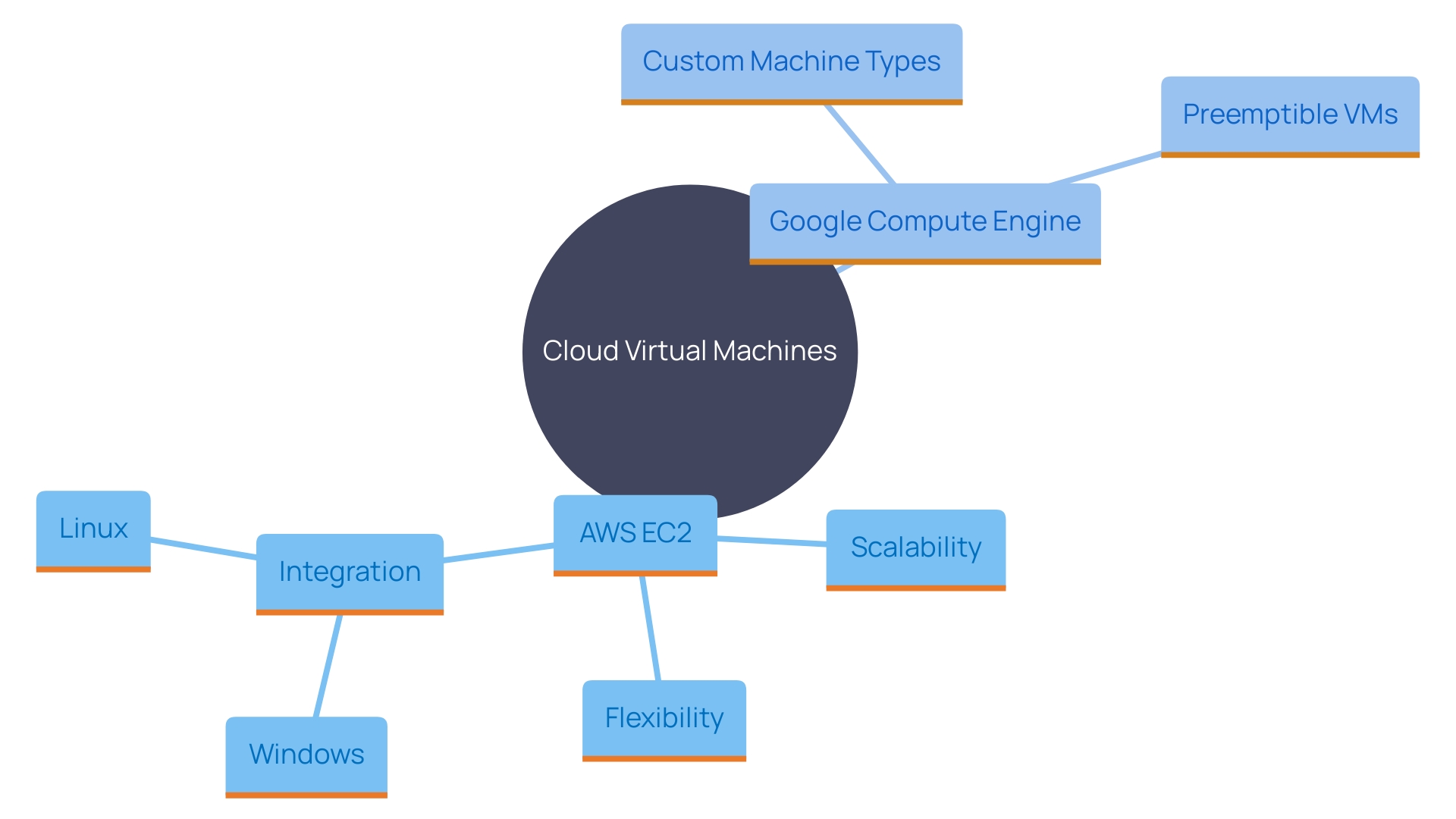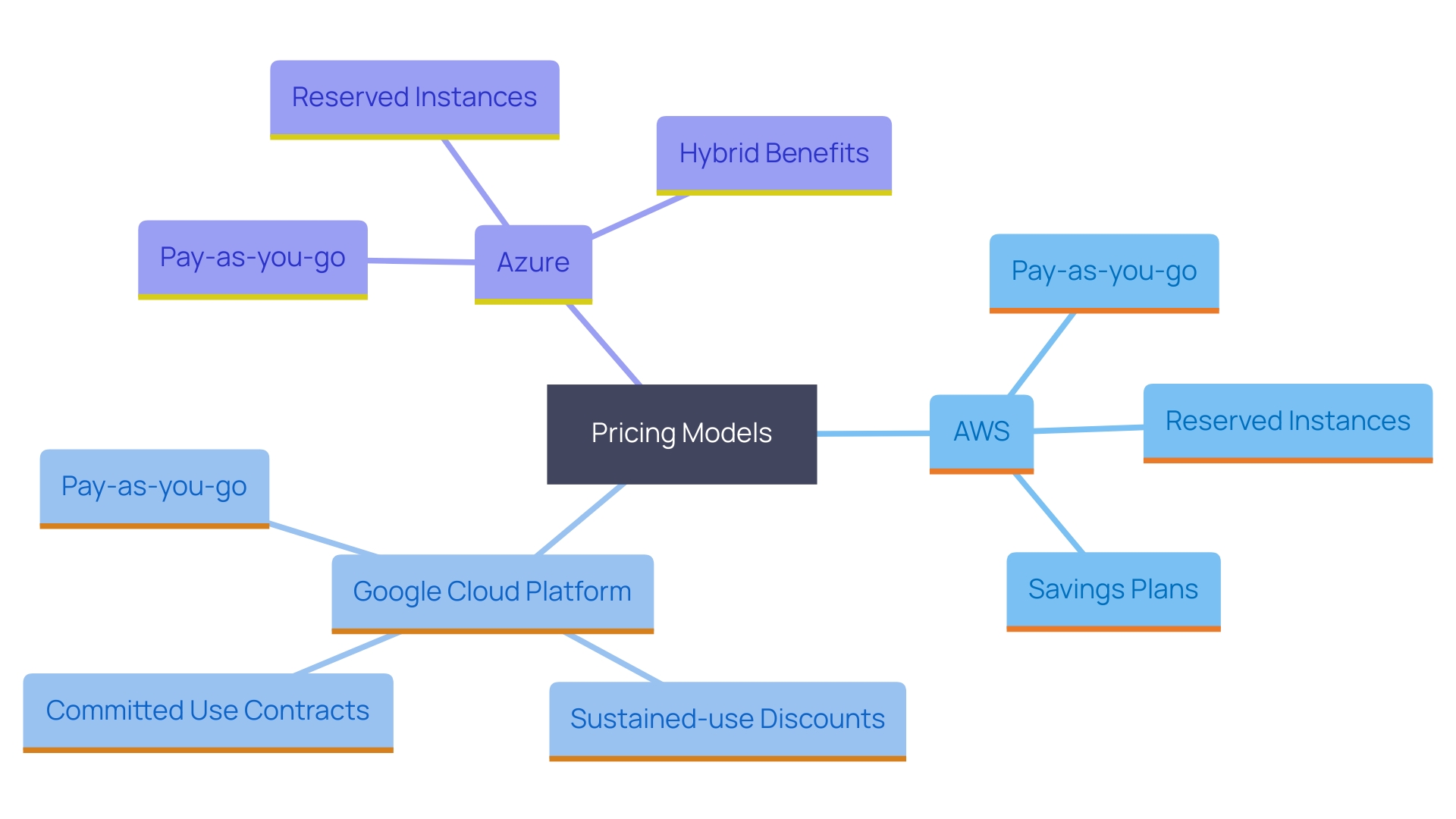Introduction
In the rapidly evolving landscape of cloud computing, three major players have emerged as leaders: Amazon Web Services (AWS), Microsoft Azure, and Google Cloud Platform (GCP). Each of these providers offers a robust suite of services tailored to meet diverse business needs. AWS, known for its pioneering efforts, provides an extensive range of offerings supported by a global infrastructure.
Azure excels in hybrid cloud capabilities and seamless integration with Microsoft products, while GCP distinguishes itself through advanced data analytics and machine learning services, leveraging Google's AI expertise.
The transition to cloud platforms has revolutionized industries by enhancing operational efficiency and innovation. For example, Aviva, a leading insurance firm, has significantly streamlined its machine learning processes, reducing the operational burden on data scientists. Similarly, the World Bank has adopted Azure Arc for centralized cloud-based solutions, improving efficiency across its diverse workforce.
Microsoft's expansion of Azure regions offers businesses greater choice and flexibility, ensuring high performance, availability, and security.
This article delves into a detailed comparison of compute services, pricing models, and industry use cases for AWS, Azure, and GCP. By examining the unique strengths and offerings of each platform, businesses can make informed decisions to optimize their cloud investments and drive digital transformation.
Overview of Azure, AWS, and GCP
Microsoft, AWS, and Google Cloud Platform (GCP) are leading service providers, each designed to address various business needs. 'AWS, the pioneer in online services, boasts an extensive range of offerings and a robust global infrastructure.'. Microsoft's online service excels in hybrid capabilities and integrates effortlessly with existing Microsoft products. GCP stands out for its advanced data analytics and machine learning services, leveraging Google's AI expertise.
For instance, Aviva, a leading insurance firm, utilizes machine learning across over 70 use cases, enhancing both efficiency and innovation. Initially, Aviva's machine learning models were developed using graphical UI tools and deployed manually, consuming over 50% of data scientists' time on operational tasks. The transition to cloud platforms has streamlined these processes significantly.
The World Bank employs a diverse workforce and sought a centralized, cloud-based solution to improve efficiency and reduce costs. They chose Arc, which offered centralized monitoring, performance, resource consumption, and security management across various platforms, including AWS.
To assist companies of various scales in their digital evolution, Microsoft has broadened its cloud regions, providing greater options and adaptability. This multi-region strategy ensures high performance, availability, and security, allowing seamless growth and market reach. The extensive suite and competitive pricing provide a compelling solution for organizations aiming to leverage the latest technologies in a dynamic digital landscape.

Compute Services Comparison
AWS EC2 (Elastic Compute Cloud) stands as a cornerstone in cloud computing, offering an extensive range of instance types to optimize diverse workloads. This service is crucial for businesses looking to scale their computing resources efficiently, akin to how the brain handles complex processing tasks. Amazon EC2's flexibility and scalability make it indispensable for high-performance computing applications and state-of-the-art generative AI models, which demand substantial computational power.
'The cloud-based virtual machines, another significant player, provides robust support for both Windows and Linux environments, seamlessly integrating with existing solutions from that company.'. This integration is particularly beneficial for enterprises heavily invested in the Microsoft ecosystem, ensuring a smooth transition and enhanced operational efficiency.
Google Compute Engine differentiates itself with custom machine types and preemptible VMs, offering cost-effective solutions for non-critical workloads. These features allow businesses to tailor their computing resources precisely to their needs, optimizing performance while maintaining budgetary constraints. The use of preemptible VMs exemplifies green computing practices by maximizing resource utilization and minimizing waste, aligning with the industry's push towards sustainability.
'Each of these cloud services—AWS EC2, Virtual Machines, and Google Compute Engine—caters to specific needs, offering unique benefits that help businesses navigate the dynamic landscape of modern cloud computing.'.

Pricing Models and Cost Comparison
The pricing models among AWS, Google Cloud Platform, and other providers offer distinct approaches tailored to diverse business needs. AWS EC2 utilizes a pay-as-you-go model, complemented by reserved instances for long-term savings. This flexibility is essential for organizations looking to manage costs effectively. Azure mirrors AWS with similar pricing models but introduces unique options such as hybrid benefits for existing Microsoft licenses, providing additional value for enterprises heavily invested in Microsoft technologies. GCP sets itself apart with a sustained-use discount that automatically applies to workloads running for a significant portion of the month, reducing costs for long-running operations. Understanding these models is crucial for cost optimization, ensuring that financial and technical teams collaborate effectively to maximize returns. As experts note, “Price is the rate at which you are charged for a product and/or service. It is not to be confused with Cost which is a function of Consumption x Price. This distinction helps organizations strategically manage their investments in online services.

Use Cases and Industry Fit
'Amazon Web Services (AWS) EC2 is often the preferred option for startups and enterprises seeking a strong online platform that provides a wide range of services.'. AWS provides a comprehensive suite that includes computing power, storage, databases, and more, making it an ideal choice for businesses looking to scale efficiently and securely. As highlighted by Gaurav Garg, a Sr. Technical Account Manager at AWS, the platform excels in building scalable and cost-effective solutions, crucial for meeting diverse business needs.
Conversely, the cloud service is frequently favored by companies deeply integrated into the software giant's ecosystem. Businesses that need hybrid solutions find Azure particularly advantageous because of its smooth integration with current Microsoft products. This is particularly relevant for companies looking to leverage their existing investments while extending their capabilities to the cloud.
Google Cloud Platform (GCP) stands out for data-centric businesses that prioritize advanced analytics and machine learning. Companies like GoDaddy, which emphasize data-driven decision-making, find GCP's offerings essential for extracting valuable insights and driving operational efficiencies. This focus on high-performance analytics makes GCP a popular choice in sectors such as finance and technology, where data is a critical asset.

Conclusion
The examination of Azure, AWS, and Google Cloud Platform (GCP) highlights the unique strengths each provider offers to meet varying business needs. AWS leads with its extensive service suite and global infrastructure, making it suitable for organizations seeking scalability. Azure is favored for its hybrid cloud capabilities and seamless integration with Microsoft products, ideal for enterprises already invested in that ecosystem.
GCP distinguishes itself with advanced data analytics and machine learning services, appealing to data-driven organizations.
In comparing compute services, AWS EC2 provides exceptional scalability for demanding applications, while Azure Virtual Machines support both Windows and Linux environments efficiently. GCP’s custom machine types and preemptible VMs offer cost-effective solutions tailored to specific workloads.
The pricing models of these platforms further illustrate their distinct approaches. Both AWS and Azure utilize flexible pay-as-you-go structures, with Azure offering hybrid benefits for existing licenses. GCP’s sustained-use discounts provide additional cost savings for long-running operations, making financial management easier.
Ultimately, selecting the right cloud provider requires a careful assessment of specific business needs and long-term objectives. By considering the strengths and offerings of AWS, Azure, and GCP, organizations can make informed decisions that optimize their cloud investments and enhance their digital transformation initiatives.




